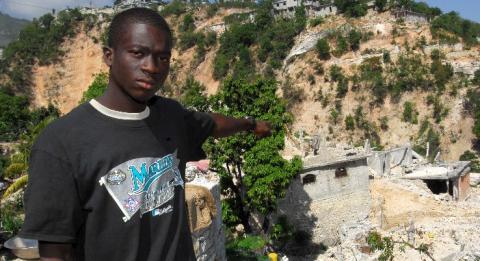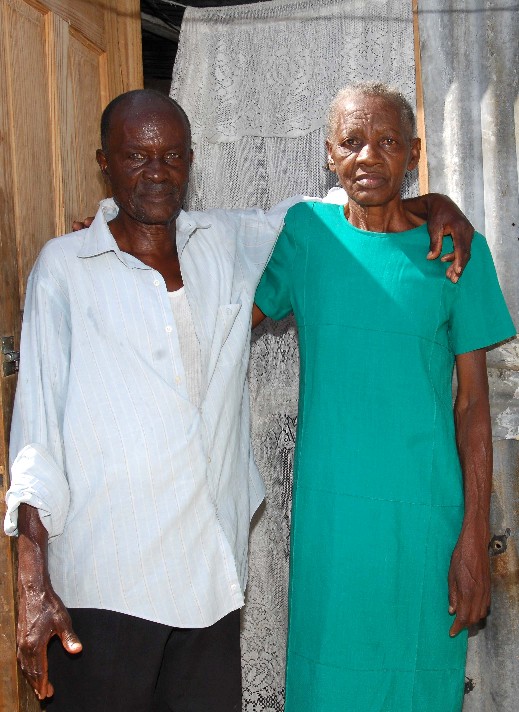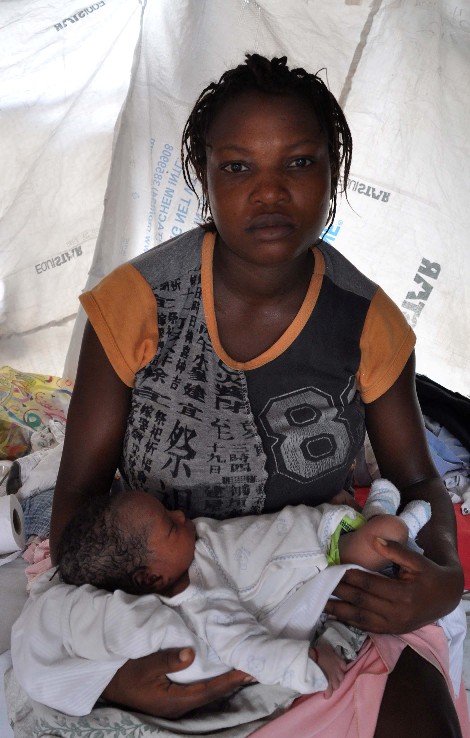Life and death in ravaged Port au Prince

For the survivors of the earthquake, the most difficult thing is continuing. Death is all around them – they have lost family, friends, communities, homes, everything. But life continues in the camps. By Deirdre O’Shaughnessy.
Life goes on. People endure. The most shocking aspect of refugee camps in Port au Prince is that one simple fact.
The most mundane aspects of life are here: women wash clothes in small basins of water distributed from tankers; they cook whatever food they have outside their tents at small camp fires; they hang clothing to dry on their tarps.
Mostly, they sit. They have no work, no fun, no prospects. They talk, but there is nothing to talk about except when the next water delivery will come. The men have spent weeks walking the city’s rubble-strewn streets seeking work. There is none.
 Children come running at the sight of us entering the camps – we are some rare entertainment. They point at our white skin, my blonde hair, our t-shirts. They want their photo taken, and they want to see the photo. They wave and play peekaboo as they follow us around our poking, prodding visit to their homes.
Children come running at the sight of us entering the camps – we are some rare entertainment. They point at our white skin, my blonde hair, our t-shirts. They want their photo taken, and they want to see the photo. They wave and play peekaboo as they follow us around our poking, prodding visit to their homes.
In Camp Citron, one of the camps set up by a community within days of their homes being destroyed, we are welcomed by a group of young men, who turn out to be the camp’s committee.
These young men, with an average age of about 20, are incredible. They speak French, some speak English; they are an intelligent bunch. They are running the camps in which thousands live, on their own. They liaise with Haven and other NGOs.
One of them answers all my questions, then politely asks why I am here and what I am doing to help. It’s a good question. I say we are here to make sure people in Ireland know the situation so they can continue to support organizations like Haven. He’s happy with that.
Another young man, Anderson, guides us around the camp. His life has been lived according to all the advice we give developing countries.
He has gone to school, worked hard, learned English, French and Spanish as well as his native Creole. His French is much better than mine, and I have a degree in it. After answering my questions about the camp patiently, he tells me he’d like to go to college. “Do you know how I could get a scholarship? I will go anywhere, anywhere in the world? I would like to be an engineer.”
 Port au Prince’s university is gone, destroyed in the earthquake. Anderson’s chances are limited purely by his place and time of birth.
Port au Prince’s university is gone, destroyed in the earthquake. Anderson’s chances are limited purely by his place and time of birth.
I have no answer for him. Later I find out he had the same conversation with everyone else in the group. His intelligence, his work ethic and his belief, without foundation it seems, that he can do this, are the hardest things of all to see in this place of no hope.
I think of young men and women at home who are handed education and opportunities like a bag of sweets and discard the wrappings on the ground after them, and I am suddenly, impotently angry. I advise Anderson to try and get a job translating for an NGO. It is the only thing I can think of.
In the camp, I meet Viagela Mathieu. A slim, dignified lady in an elegant green shift dress, she is the oldest person I have seen in Haiti. The interpreter tells me Madame is 69-years-old. She lost two children in the earthquake.
She lives in the camp with her remaining five children. What strikes me about Viagela is her stillness. She answers my questions almost silently, with imperceptible nods and a blank expression. It’s as if she believes that speaking loudly or moving too much will cause another ‘tremblement’ and destroy all of their lives again. Her husband smiles for the camera and puts his arm around her and all the while she stares straight ahead. I pat her gently on the arm as I leave, to thank her for her help. She doesn’t react.
Camp Toto was found by Haven workers just two weeks ago. This rocky hillside across a rocky ravine from its residents’ former homes hosts 2000 people, while four neighbouring camps are home to 8000 more.
When Haven workers reached the camp, which is located off the beaten track in an area blocked off by rubble, they were aghast to learn they were the first NGO to help. There is a painted wall outside with the phone numbers of the camp’s committee members – everyone has a mobile phone, thanks to Denis O’Brien’s Digicel – and the words ‘We need help. We love all’.
The Government plans to move 10,000 more people into an area adjacent which it has flattened with bulldozers – those who will move in here have just been cleared from the grounds of St Louis Gonzaga school, which needs to reopen. Some of their tents have been destroyed; they were given just hours’ notice of the move.
A camp committee, set up by residents including Falayraud Edzei, has ensured a tidy layout and has helped Haven start building latrines and sanitation facilities. Edzei had an import/export business; he’s educated, with good French, and is helpful and energetic. He lost everything in the quake.
Louie Camen was pregnant before the quake, and she’s due in May. She’s 19 years old, and her husband is in the camp with her. This will be her first baby. A slim girl with a shy smile and cropped hair, as she speaks to me, abashed, through a forceful interpreter, one hand cups her belly protectively while the other grips the umbrella sheltering her from the merciless heat of the early afternoon. Her husband is good, she says, but she is afraid to have her baby here.
As we scramble further up the hill, children pointing and laughing at our hands-and-knees ascent between tarp shacks up the stepped rocky terrain, I am drawn to another tent by Mr Edzei.
A woman ambles out to meet us, holding her abdomen in pain. She has the same glazed look I met in Camp Citron, as if any expression will cause all her pain and grief to escape.
She is in her early twenties, and has just given birth, they tell me. Her baby was born on Saturday – just four days ago. Neither of them has seen a doctor, and she is in a lot of pain, she says.
We go into the tent. Outside the temperature is about 48 degrees, but inside this plastic oven it is hotter, over 50, I think. The baby lies on his back on the family’s makeshift bed – he is wearing a stained babygro and lying on a sheet. There are no nappies, and the stinking tent is scattered with stained clothing. I can hear the baby’s laboured breathing from the doorway.
The baby hasn’t been named yet – his father, Bertoni, will name him. Bertoni has no work and the couple has two other children. Both parents lost their families in the earthquake, and this girl gave birth alone. I have never seen anyone look so desolate. She lost her parents in the tremblemenet,
I think for a moment of all the babies born in Cork on the same day, and how they will be home from CUH by now, surrounded by balloons and flowers and showered with love. I have a dollar in my pocket, somehow, as we were warned not to carry cash. We’re not supposed to, but I give it to her anyway, ‘pour la bébé’. It’s not much, even here.
Deirdre O’Shaughnessy travelled to Haiti with the Haven Partnership. To donate, visit www.havenpartnership.com. Haven works to build homes in Haiti as well as providing emergency water and sanitation assistance in Port au Prince.
